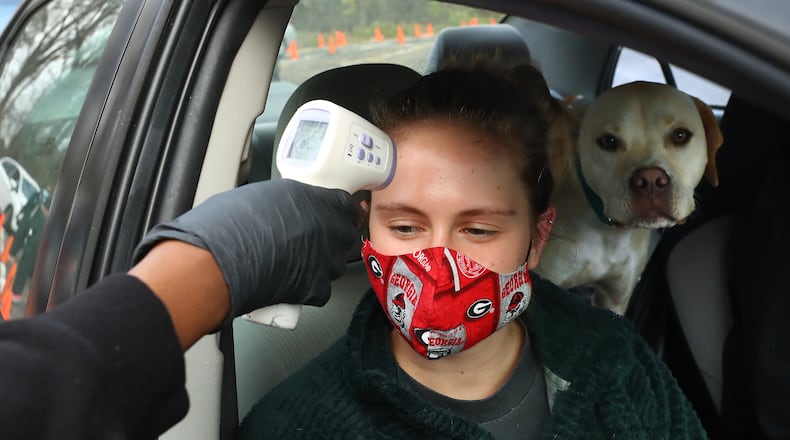Thousands of Georgia employers are back to making their own decisions about whether to require COVID-19 vaccinations or testing for their employees. As a result, local workers are likely to continue to face workplaces with widely varying standards.
The U.S. Supreme Court on Thursday barred the Occupational Safety and Health Administration from enforcing a federal requirement that employers with 100 or more people ensure that their workers are vaccinated or undergo weekly testing.
But the ruling doesn’t prevent employers from dictating vaccinations on their own. And the high court allowed the Biden administration to continue a vaccine mandate for most health care workers. Legal appeals are underway on another mandate tied to companies that are federal contractors.
Many employers say they want their employees to be vaccinated to hopefully keep them safe, reduce risk to co-workers and avoid business disruptions.
Some would rather the federal government had the responsibility — and the blame — for the mandates. But lots of other employers — including many that worried a vaccine requirement would cause some workers to quit — are glad to be able to chart their own course.
“Generally, I think there was a sigh of relief,” said Chris Clark, chief executive officer of the Georgia Chamber.
Many companies worried about costs and complexities, Clark said. But the biggest concern focused around keeping workers in an already tight labor market.
Some manufacturers that are members of the Georgia Chamber surveyed their workforces and found that 10% to 25% said they would quit if required to be vaccinated, he said. Other companies that have more office-based staff found that 8% to 10% said they would leave.
Most local employers seem to be interested in incentivizing vaccinations rather than mandating them, Clark said. But he hasn’t surveyed members to see how many have requirements in place already.
Atlanta-based Southern Company said in an email Friday that it and its subsidiaries, including Georgia Power, “have suspended implementation of the COVID-19 vaccination or testing requirement,” in light of the Supreme Court ruling. “We continue to encourage employees to get vaccinated and provide paid time for employees to receive vaccinations, boosters and/or if they experience side effects.”
A spokeswoman for Home Depot, which has more than half a million employees, said the company is “still looking at the ruling.”
The Atlanta-based company hadn’t launched a vaccination requirement, but it had been asking staffers about their vaccination status. Recently, the company pushed back its planned mid-January reopening of corporate offices until Feb. 7 because of the dramatic surge in COVID-19 cases in recent weeks.
In the fall, Coca-Cola Co. told its U.S. employees they would fall under the government vaccination rule for federal contractors. The company paid $2,000 bonuses to those who complied by Dec. 8. But Coke postponed vaccination enforcement after court decisions put the contractor requirement on hold. As of mid December, 91% of Coke’s U.S. staffers were fully vaccinated, according to a company email to employees.
Coke spokesman Scott Leith wrote in a Friday email: “We continue to follow developments on legal requirements related to vaccines. We continue to encourage employees to get vaccinated and follow all safety protocols.”
Nationally, about a third of employers required at least some employees to be vaccinated, according to a November survey by Mercer, a human resources consulting firm. The vast majority of those who set mandates said they hadn’t seen any increase in employee turnover.
“The conversations Mercer is having with clients are all over the map,” in terms of whether and what kinds of vaccine requirements they may create, Mary Kay O’Neill, a senior partner, wrote in an email Friday.
Some are proceeding with vaccination and testing mandates even in the wake of the Supreme Court’s decision, she said. Others are shelving those plans.
Former OSHA chief Ed Foulke, now an Atlanta-based partner at the law firm Fisher Phillips, said he’s expecting a mix of actions as well. With COVID-19 cases increasing, companies want to make sure employees stay healthy and can work, without having overly burdensome mandates, he said. Many weren’t against requirements to regularly test unvaccinated employees, but they didn’t know where they would be able to find enough tests.
Ken Winkler, an attorney at the Atlanta law firm Berman Fink Van Horn, said employers should watch for legal developments, especially if they are in industries where their employees work in cramped environments or serve a vulnerable population. “It appears the ruling left open the possibility for OSHA to draft regulations targeted at specific workplaces where the virus creates special danger,” he wrote in an email.
Many Georgia health care facilities already had been preparing for the Supreme Court to uphold the federal vaccination mandate that applied to their sector.
All metro Atlanta hospitals except Children’s Healthcare of Atlanta and Northside began instituting vaccination mandates last year. In statements Friday, CHOA and Northside said they were now trying to understand what the final federal guidelines and deadlines would be.
The biggest staffing problems may arise in rural areas, where vaccination rates are lower.
Nursing homes already have been sending panicked calls and emails to their professional association about the staff shortages during the omicron wave, said Tony Marshall, president of the Georgia Health Care Association. Several Georgia nursing homes have fewer than 50% of their staff vaccinated, he said. By the end of March, the federal government will start levying fines against facilities that haven’t complied.
“That’s always been our fear of a mandate, the disproportionate impact on a relatively few centers but it happens to be in areas where they’re the sole source of long-term care,” Marshall said. “So it can have a potentially devastating impact on those communities if the workforce doesn’t choose to get vaccinated.”
Keep Reading
The Latest
Featured




